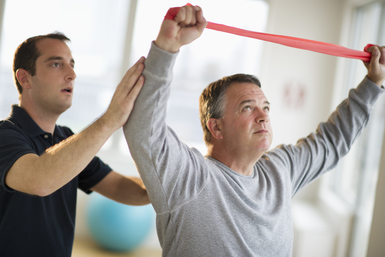Shoulder pain can affect much more than just our comfort. It can limit our ability to pick up our children, carry groceries, or even reach for something on a high shelf. If you’ve been struggling with nagging shoulder pain, there’s a strong possibility it may be due...
A stress fracture is a small crack within a bone. However, unlike acute fractures, which occur from a sudden injury, stress fractures gradually develop over time and are common among athletes, runners, and individuals with physically demanding lifestyles. These tiny,...
Tendons are tough, fibrous tissues that connect muscle to bone and play a critical role in our movement, from helping us swing a tennis racket to allowing us to lift groceries or climb the stairs. But for all their strength and flexibility, tendons are also...
Exercises that can Affect your Shoulder Surgery

Shoulder injuries are a cause of discomfort and pain for many people. The reasons behind shoulder injuries vary but usually are a result of loss of elasticity in joints and flexibility in the elderly or trauma in younger people.
Athletes suffer shoulder injuries as a result of over training and repeated trauma to the shoulder when training. In young people, it is usually as a result of sudden but great physical trauma being borne by the shoulder e.g. in a falling accident. The elderly suffer shoulder injuries due to the effects of age on the body, namely loss of flexibility and elasticity of the muscles and joints.
The most common shoulder injury is tearing of the rotator cuff tendon/ tendons. Exercising too much when one has such an injury results in the worsening of the condition. It is therefore important for one to ensure they go over various forms of exercises that they can safely perform. This is to prevent the worsening of the condition.
Exercising before and after shoulder surgery is recommended in most cases. This is because it increases the rate of recovery after the surgery. However, too much of anything is poisonous; this is especially so for exercising before or after surgery. Pre-hab should run for at least 6 weeks, and the more time spent on it, the better.
Training before undergoing a shoulder operation has been linked to faster recovery time. Patients also require less inpatient rehabilitation as compared to exercising only after surgery. Depending on the severity of one’s shoulder injuries, a combination of land-based and water-based exercises is used. Recommended exercises involve stretching and using the arm’s own weight while exercising. Range of motion exercises are also very effective and safe.
Exercises that place a lot of stress on the shoulder’s joint and muscles should be avoided. Weight training is one of the most harmful exercises one can perform when preparing for shoulder surgery. This is especially so when the shoulder injury is a result of a tear. By subjecting the injured shoulder to the stress of weight training, one increases the chances of worsening the tear. This is made even more likely by the fact that one cannot properly use the injured arm. This results in wrong form and technique while exercising, making it the most common cause of injury in inexperienced weightlifters.
Using one’s body weight too is also discouraged when a lot of the load has to be borne by the shoulders. Not only do exercises such as chin-ups, push-ups and pull-ups place considerable strain on the shoulder joints and muscles, they require a wide range of motion too. This can be a dangerous combination to anyone suffering considerable shoulder injury.
One should also avoid exercises that require a wide range of motion while still placing a considerable load on the shoulder joint. Activities and sports such as lawn tennis, baseball and cricket shouldn’t feature on the list of someone prepping for shoulder surgery. Vigorous swimming can also pose a threat especially if the injury in extensive. Imagine the strain placed on shoulder muscles and joints when one is swimming fast using the butterfly stroke.
Whatever type of injury one has suffered or how they are currently feeling, it is advisable to always consult a doctor or orthopaedic professional. In fact, the best person to come up with a pre-hab plan and schedule should be the doctor or a member of the team treating you. Contact Premier Orthopaedics for more information or download our free eBook, The Pre-Operative Guide to Shoulder Surgery.

